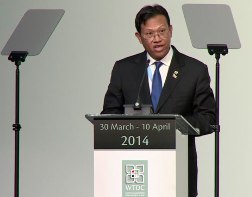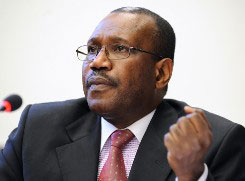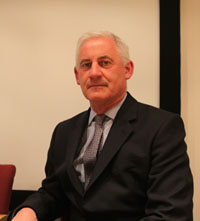Even as the Australian naval vessel, Ocean Shield, was picking up a pulse of what could be the flight data and cockpit voice recorder of the missing MH370 aircraft in the southern Indian Ocean, thousands of miles away in the Dubai World Trade Center, a momentous commitment was made to integrate future flight data recorders with big data and cloud computingto prevent the costly and unfeasible recovery of black boxes after airline disasters.
At one of the more poignant opening statements that marked the opening of World Telecommunications Development Conference, (the quadrennial conference of the International Telecommunication Union to set out the priorities and plan to assist developing countries with their ICT infrastructure), Malaysian minister for communications and multimedia, Ahmed Shabery Cheek, called upon ITU to develop leading edge standards to facilitate the transmission of flight data in real time.

“I believe that data from aircraft, including from the black box could be continuously transmitted and stored in data centres on the ground,” said Ahmad Shabery Cheek, Malaysian Minister for Communications and Multimedia. “I urge ITU to work with industry to develop a better way to constantly monitor flight data and what is happening in the cockpit. With the advancements in ICT today, we should be able to retrieve and analyse this data without necessarily locating the black box. I believe that this simple change may have brought a different outcome today.”
Cheek pointed to the irony that whilst communications technologies have evolved drastically in the past five years, the story of the black box remains unchanged from 30 years ago.

Expressing sympathy and concern for the uncertainty surrounding the fate of the passengers on board MH370, ITU Secretary-General Hamadoun I. Touré said, “We must ensure that aircraft can be tracked in real time so that such an unprecedented and tragic incident does not occur again. ITU is committed to work on the standards that will take advantage of big data and state-of-the-art cloud computing.”
“ITU will invite avionics and aircraft manufacturers along with satellite operators and airlines to work on new standards to track aircraft in real time,” said Malcolm Johnson, Director of ITU’s Standardization Bureau. “We share the anxiety expressed by Minister Cheek and will take steps to urgently address this situation.”
.jpg)
“Inmarsat would be happy to work with ITU to develop a global solution to the challenge of tracking commercial aircraft,” offered Chris McLaughlin, Senior Vice President External Affairs of Inmarsat, the British satellite telecommunications company which helped provide clues to the possible track flown by the missing Boeing 777-200. “We recognize that this will require developing expertise in the interest of passengers and operators to further increase safety in the air.”

All commercial airlines and corporate aircraft are required to install and use ‘black boxes’ to track a number of flight parameters. The flight data recorder (FDR) is designed to record the operating data from an aircraft’s systems, including pressure altitude, airspeed, vertical acceleration, magnetic heading and position of control systems. Cockpit Voice Recorders (CVRs) record what the crew say and monitor any sounds that occur within the cockpit. These two pieces of monitoring equipment provide investigators with vital clues about the cause of an accident.

Malaysian Communications and Multimedia Commission chairman Mohamed SharilTarmizi has also highlighted the importance of selection and categorisation of data for streaming from airlines to earth-based data centres. “Experts need to know which data should be sent in real time, in stages or during emergencies,” he told Malaysian press agency, Bernama.
Malaysian Airlines Flight MH370 on 8 March disappeared while on a routine flight from Kuala Lumpur to Beijing. A number of countries have joined the search for the missing aircraft and its 239 passengers and crew, currently deploying search aircraft and vessels to scour vast tracts of the southern Indian Ocean.